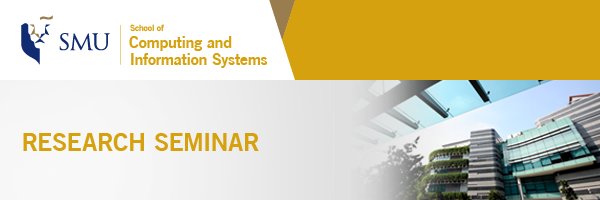| |
 The Cognitions and Emotions in Human-AI Collaborations
with Augmented Reality: A Dual-Coding Perspective Speaker (s):

Ben Choi
Associate Professor,
Information Technology and
Operations Management,
Nanyang Technological University
| Date: Time: Venue: | | 6 March 2025, Thursday 2:30pm – 4:00pm This is a virtual seminar.
Please find meeting link as follows:
https://smu-sg.zoom.us/j/96417922103
Meeting ID: 964 1792 2103 We look forward to seeing you at this research seminar.  |
|
About the Talk Artificial intelligence (AI) is expected to revolutionize the existing methods of augmented reality processing and natural voice interactions, through which humans collaborate with AI agents to complete specific tasks. In contrast to human-human digital collaborations, which facilitate mutual understanding and synchronized attention, human-AI collaborations focus on optimizing the comprehensibility of AI instructions. Drawing on the instructional design literature, this study considers two augmented reality features facilitating progressive, multiple-round human-AI collaborative diagnosis (i.e., verbalized instructions and visual illustrations) and examines how verbalized instructions and visual illustrations affect diagnosis effectiveness and efficiency. We enrich the instructional design literature by integrating dual-coding theory to elucidate the interaction effect of the two features and reveal the underlying mechanisms through the mediating effects of cognitive effort and confused emotion. We conducted two laboratory experiments involving augmented reality devices and neuroscience techniques. The results show that inductive instructions with schematic illustrations elevated diagnosis efficiency. Meanwhile, inductive instructions with structural illustrations led to significantly higher diagnostic effectiveness. Furthermore, cognitive effort and confused emotions simultaneously mediated the effects of augmented reality on diagnostic performance with humanoid verbalization. Confused emotions were in play with robotic verbalization. Overall, this study contributes to the human-AI collaboration literature and dual-coding theory by unraveling the effects of instructional designs in augmented reality on human-AI collaborative diagnosis. About the Speaker Ben Choi is an associate professor in Information Technology and Operations Management at the Nanyang Technological University. He was previously a faculty at the University of New South Wales. He has been named the Best Associate Editor (2024) and Reviewer of the Year at the Journal for the Association of Information Systems (2020) and received the Best Reviewer Award at MIS Quarterly (2016). He has published multiple papers in premier information systems journals, including Information Systems Research, Journal of Management Information Systems, Journal of the Association for Information Systems, and Production and Operations Management. His research interests focus on human-algorithm/robotic interactions, data visualizations, sustainability, and information privacy using various methods (i.e., lab/field experiments, surveys, driving and flight simulations, machine learning, artificial intelligence, and physiological measurements, such as voice and respiration analytics, GSR, EEG, functional near-infrared spectroscopy (fNIRS), and eye-tracking).
Ben is the recipient of the Nanyang Education Award 2023. |